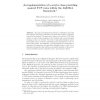Free Online Productivity Tools
i2Speak
i2Symbol
i2OCR
iTex2Img
iWeb2Print
iWeb2Shot
i2Type
iPdf2Split
iPdf2Merge
i2Bopomofo
i2Arabic
i2Style
i2Image
i2PDF
iLatex2Rtf
Sci2ools
128
click to vote
ARTQOS
2003
Springer
2003
Springer
An Implementation of a Service Class Providing Assured TCP Rates within the AQUILA Framework
This paper investigates an attempt to establish a QoS class that supports long-lived, bulk-data TCP flows that require a minimum rate from the network. The approach is based on a model for TCP flows subject to token bucket marking at the network edge and preferential dropping in the core network. The service class adds admission control functionality and a model for multi-RED queue management to the token bucket marker. The difficulty of parameterizing the mechanisms is discussed and analyzed in an explorative simulation study. A set of configuration parameters that enables a successful operation of the service class is identified and the achievable service provisioning is shown.
| Added | 06 Jul 2010 |
| Updated | 06 Jul 2010 |
| Type | Conference |
| Year | 2003 |
| Where | ARTQOS |
| Authors | Christof Brandauer, Peter Dorfinger |
Comments (0)

